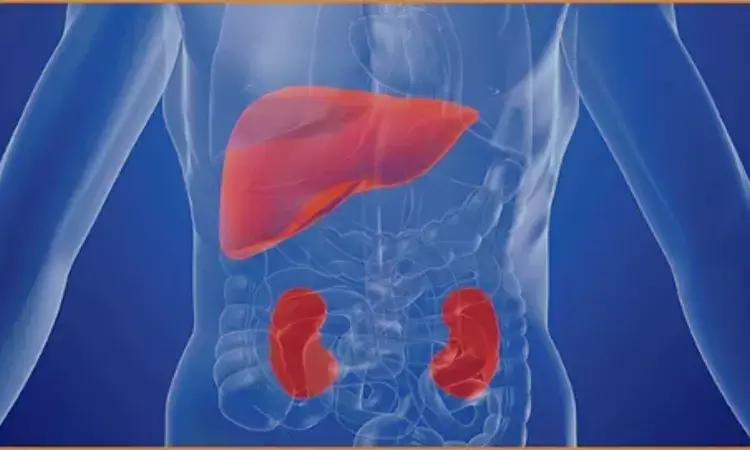- Home
- Medical news & Guidelines
- Anesthesiology
- Cardiology and CTVS
- Critical Care
- Dentistry
- Dermatology
- Diabetes and Endocrinology
- ENT
- Gastroenterology
- Medicine
- Nephrology
- Neurology
- Obstretics-Gynaecology
- Oncology
- Ophthalmology
- Orthopaedics
- Pediatrics-Neonatology
- Psychiatry
- Pulmonology
- Radiology
- Surgery
- Urology
- Laboratory Medicine
- Diet
- Nursing
- Paramedical
- Physiotherapy
- Health news
- Fact Check
- Bone Health Fact Check
- Brain Health Fact Check
- Cancer Related Fact Check
- Child Care Fact Check
- Dental and oral health fact check
- Diabetes and metabolic health fact check
- Diet and Nutrition Fact Check
- Eye and ENT Care Fact Check
- Fitness fact check
- Gut health fact check
- Heart health fact check
- Kidney health fact check
- Medical education fact check
- Men's health fact check
- Respiratory fact check
- Skin and hair care fact check
- Vaccine and Immunization fact check
- Women's health fact check
- AYUSH
- State News
- Andaman and Nicobar Islands
- Andhra Pradesh
- Arunachal Pradesh
- Assam
- Bihar
- Chandigarh
- Chattisgarh
- Dadra and Nagar Haveli
- Daman and Diu
- Delhi
- Goa
- Gujarat
- Haryana
- Himachal Pradesh
- Jammu & Kashmir
- Jharkhand
- Karnataka
- Kerala
- Ladakh
- Lakshadweep
- Madhya Pradesh
- Maharashtra
- Manipur
- Meghalaya
- Mizoram
- Nagaland
- Odisha
- Puducherry
- Punjab
- Rajasthan
- Sikkim
- Tamil Nadu
- Telangana
- Tripura
- Uttar Pradesh
- Uttrakhand
- West Bengal
- Medical Education
- Industry
MAFLD tied to hyperfiltration and amplification of age-related eGFR decline across all glycaemic spectrum: Study

Spain: In a pioneering cross-sectional population study, researchers have uncovered a significant association between Metabolic Associated Fatty Liver Disease (MAFLD) and glomerular hyperfiltration across varying states of glucose metabolism. The study offers valuable insights into the intricate interplay between liver health and kidney function in individuals with different glucose metabolic statuses.
The researchers revealed increases in MAFLD prevalence across the glycaemic spectrum. MAFLD is significantly associated with hyperfiltration and amplifies the age-related decline in eGFR (estimated glomerular filtration rate). The findings were published online in Diabetes/Metabolism Research and Reviews.
MAFLD, formerly known as non-alcoholic fatty liver disease (NAFLD), represents a spectrum of liver conditions characterized by hepatic steatosis, inflammation, and fibrosis. While the association between MAFLD and glucose metabolism abnormalities has been well-documented, its impact on renal function remains a subject of ongoing investigation.
Against the above background, Miquel Bennasar-Veny, Research Group on Global Health, University of the Balearic Islands, Palma, Spain, and colleagues aimed to assess MAFLD prevalence and its association with glomerular hyperfiltration and age-related worsening of kidney function in subjects with prediabetes, normoglycemia, and type 2 diabetes mellitus (T2DM).
For this purpose, the researchers analyzed data recorded during occupational health visits of 125,070 Spanish civil servants aged 18–65 years with a de-indexed GFR estimated with the chronic-kidney-disease-epidemiological (CKD-EPI) equation (eGFR) ≥60 mL/min.
According to fasting plasma glucose levels, subjects were classified as <100 mg/dL (normoglycemia), ≥100 and ≤ 125 mg/dL (prediabetes), or ≥126 mg/dL, and antidiabetic treatment (T2DM).
The association between MAFLD and glomerular hyperfiltration, defined as a de-indexed eGFR above the gender- and age-specific 95th percentile, was evaluated by multivariable logistic regression.
The study revealed the following findings:
- In the whole study group, MAFLD prevalence averaged 19.3%.
- The prevalence progressively increased from 14.7% to 33.2% and 48.9% in subjects with normoglycemia, prediabetes, and T2DM, respectively.
- The adjusted odds ratio for the association between MAFLD and hyperfiltration was 9.06 in the study group considered as a whole, and 8.60, 9.52, and 8.31 in subjects with normoglycemia, prediabetes, and T2DM considered separately.
- In stratified analyses, MAFLD amplified age-dependent eGFR decline in all groups.
The study showed that in the general population of subjects with preserved kidney function, MAFLD prevalence increases across the glycaemic spectrum in parallel with the progressively increasing prevalence of glomerular hyperfiltration.
"The strong association between MAFLD and hyperfiltration at any glucose level suggests that these two abnormalities may share common and interconnected pathogenic mechanisms that could also contribute to the CKD onset and progression," the researchers wrote. This could explain why MAFLD's presence amplified the age-related eGFR decline.
"There is a need for longitudinal studies to investigate whether and to what extent the MAFLD is an independent risk factor for accelerated GFR decline (and possibly excess CVD risk) and whether sustained MAFLD amelioration could translate into a substantial nephroprotection (and cardioprotection) in the long-term, even in the non-diabetic population," they concluded.
Reference:
Abbate, M., Parvanova, A., López-González, Á. A., Yañez, A. M., Bennasar-Veny, M., Ramírez-Manent, J. I., Reseghetti, E., & Ruggenenti, P. (2024). MAFLD and glomerular hyperfiltration in subjects with normoglycemia, prediabetes and type 2 diabetes: A cross-sectional population study. Diabetes/Metabolism Research and Reviews, 40(4), e3810. https://doi.org/10.1002/dmrr.3810
Dr Kamal Kant Kohli-MBBS, DTCD- a chest specialist with more than 30 years of practice and a flair for writing clinical articles, Dr Kamal Kant Kohli joined Medical Dialogues as a Chief Editor of Medical News. Besides writing articles, as an editor, he proofreads and verifies all the medical content published on Medical Dialogues including those coming from journals, studies,medical conferences,guidelines etc. Email: drkohli@medicaldialogues.in. Contact no. 011-43720751


